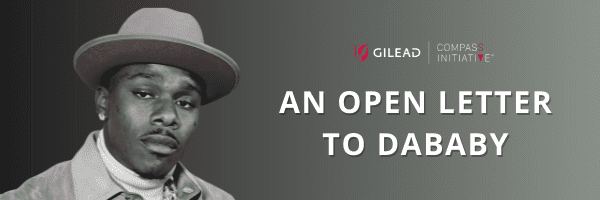Q&A with COMPASS Coordinating Center Directors
Our first contributors need no introduction. Well-known in their respective fields, Patrick Sullivan, PhD, DVM, Nic Carlisle, JD, and Samira

Wednesday, August 4, 2021
An Open Letter to DaBaby:
We, the undersigned, represent organizations leading the fight to prevent HIV and provide care and treatment for people living with HIV, especially Black LGBTQ people across the Southern United States.
We heard your inaccurate and harmful comments at Rolling Loud and have read your Instagram apology. However, at a time when HIV continues to disproportionately impact Black Americans and queer and transgender people of color, a dialogue is critical. We must address the miseducation about HIV, expressed in your comments, and the impact it has on various communities.
2021 marks the 40th year of the HIV/AIDS epidemic and the greatest obstacles in our work to end HIV are the compounded stigmas attached to anti-Blackness, living with HIV, misogyny, and anti-LGBTQ attitudes and stereotypes, all of which are fueled by misinformation. Fear and stigma keep people, particularly Black Americans, from accessing HIV prevention or care that White Americans have historically accessed and continue to access more easily. We believe you now have an opportunity to not just move past this unfortunate incident, but to use your platform and celebrity to heal not harm.
We believe that anyone can be an HIV advocate by amplifying: how there is medication (PrEP) that can prevent people from getting HIV with one pill a day, how routine treatment stops the virus from being passed on by people living with the HIV, how people receiving HIV care can survive and thrive while living with it, and how open and empathetic conversations eliminate stigma. You can be a powerful and influential voice, especially across your home base in the South, where the Black community’s needs are notoriously under-represented across every public spectrum. We encourage you to share this information with your fans and followers, and become an agent of truth and change.
Music artists have historically led the way to lift up understanding of HIV and accelerate LGBTQ acceptance. Several artists and platforms have spoken up against you. While we appreciate their stand, we also invite them to take action and to do their part to end HIV by supporting organizations like ours serving people who are Black, LGBTQ and/or living with HIV.
As mentioned in your latest apology, education is important. We agree. GLAAD and Gilead Science’s 2020 State of HIV Stigma Study found that 90% of Americans believe “there is stigma around HIV,” that “people are quick to judge those with HIV,” and “people make assumptions when someone is tested for HIV.” There were a significant number of people (40%) who did not know that HIV can be treated. Nearly 60% wrongfully believe it is “important to be careful around people living with HIV to avoid catching it.”
Here are the facts:
As leaders of organizations directly serving Black, LGBTQ, and HIV+ communities, we invite you to a private, off-the-record, virtual discussion with us. You stated you now understand how and why your comments were damaging. An open conversation holds the potential for you to now create meaningful impact by transforming from an adversary to an advocate.
Sincerely,
Dr. Samira Ali, Director, SUSTAIN Center at the University of Houston Graduate College of Social Work
Dr. Davin D. Clemons, CoFounder and Chief Financial Officer, Relationship Unleashed
Gwendolyn D. Clemons, CoFounder and Executive Director, Relationship Unleashed
Kia Colbert, Program Director, EnCORE, Emory Centers for Public Health Training and Technical Assistance
Raniyah Copeland, President and CEO, Black AIDS Institute
Ian L. Haddock, Founder and Executive Director, The Normal Anomaly Initiative
Arianna Inurritegui-Lint, Founder of Arianna’s Center
Rev. Dr. Shonda Jones, Wake Forest Faith Coordinating Center
Dr. Allison Mathews, Wake Forest University Faith Coordinating Center
Deondre B. Moore, U.S. Partnerships & Community Engagement Manager, Prevention Access Campaign
Warren A. O’Meara-Dates, Founder/Chief Executive Officer, The 6:52 Project Foundation, Inc.
Neena Smith-Bankhead, Center Director, EnCORE, Emory Centers for Public Health Training and Technical Assistance
Bec Sokha Keo (they/them), Public Impact Scholar, SUSTAIN Center at the University of Houston Graduate College of Social Work
DaShawn Usher, Associate Director, Communities of Color, GLAAD
Dafina Ward, Executive Director, Southern AIDS Coalition
Our first contributors need no introduction. Well-known in their respective fields, Patrick Sullivan, PhD, DVM, Nic Carlisle, JD, and Samira
Column By: Tiffany Smith Tiffany lives in Atlanta, GA and works with the Emory COMPASS Coordinating Center. She previously worked
Column By: Tiffany Smith Tiffany lives in Atlanta, GA and works with the Emory COMPASS Coordinating Center. She previously worked
Emory University COMPASS Coordinating Center is excited to announce a monthly webinar series geared towards building the organizational capacity of
©2025 Emory University, Inc. All rights reserved.
When you click this link, you will be directed to an external webpage hosted by LearnUpon LMS.
Kindly note that registration is required, and it’s entirely free of charge.
To access the learning modules, you will need to create a new login, as this platform operates independently and is not affiliated or connected with OpenWater or any other platforms used by the Gilead COMPASS Initiative®.